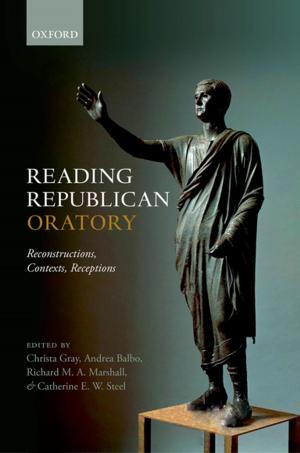Criminal Misconduct in Office
Law and Politics
Nonfiction, Reference & Language, Law, Constitutional, Social & Cultural Studies, Political Science| Author: | Jeremy Horder | ISBN: | 9780192556882 |
| Publisher: | OUP Oxford | Publication: | March 2, 2018 |
| Imprint: | OUP Oxford | Language: | English |
| Author: | Jeremy Horder |
| ISBN: | 9780192556882 |
| Publisher: | OUP Oxford |
| Publication: | March 2, 2018 |
| Imprint: | OUP Oxford |
| Language: | English |
Should the criminal law be used to deter and punish corruption in politics: from employing family members at public expense to improper spending on elections, lobbying, and cronyism? How did so many MPs avoid facing charges after the 2009 government expenses scandal? In this book, Jeremy Horder tackles these questions and more. As well as offering the first treatment of the history, philosophy, and politics of the application of the offence of misconduct in office to Members of Parliament in England and Wales, Horder explains how political corruption might be dealt with in future, and how politicians could be held accountable for their actions so that they are deterred from betraying the public's trust. Use of the criminal law should not be the sole or even the main way to remedy all corruption in politics. Nevertheless, for too long the offence of misconduct in a public office has had an ambiguous status in the political realm. If we are to preserve the good health of government it must be seen as a constitutional fundamental. A charge of misconduct provides a way in which corrupt conduct on the part of legislators can be punished with an appropriate label, holding them to account for the misuse of power by reference to the standards of ordinary people. When other - civil law or regulatory - means prove insufficient, it should be possible for ordinary members of a jury, and not for Parliamentarians or other officials, to decide whether, for example, the expenditure of public money on legislators' private income and benefits amounts to a criminal abuse of the public's trust. This book offers an authoritative and accessible account of a 'bottom-up' (jury standards-led), as opposed to a 'top-down' (officials applying their own standards), approach to the role of the criminal law in constitutional contexts.
Should the criminal law be used to deter and punish corruption in politics: from employing family members at public expense to improper spending on elections, lobbying, and cronyism? How did so many MPs avoid facing charges after the 2009 government expenses scandal? In this book, Jeremy Horder tackles these questions and more. As well as offering the first treatment of the history, philosophy, and politics of the application of the offence of misconduct in office to Members of Parliament in England and Wales, Horder explains how political corruption might be dealt with in future, and how politicians could be held accountable for their actions so that they are deterred from betraying the public's trust. Use of the criminal law should not be the sole or even the main way to remedy all corruption in politics. Nevertheless, for too long the offence of misconduct in a public office has had an ambiguous status in the political realm. If we are to preserve the good health of government it must be seen as a constitutional fundamental. A charge of misconduct provides a way in which corrupt conduct on the part of legislators can be punished with an appropriate label, holding them to account for the misuse of power by reference to the standards of ordinary people. When other - civil law or regulatory - means prove insufficient, it should be possible for ordinary members of a jury, and not for Parliamentarians or other officials, to decide whether, for example, the expenditure of public money on legislators' private income and benefits amounts to a criminal abuse of the public's trust. This book offers an authoritative and accessible account of a 'bottom-up' (jury standards-led), as opposed to a 'top-down' (officials applying their own standards), approach to the role of the criminal law in constitutional contexts.















